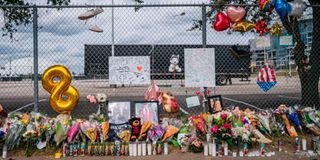Premium
Revellers say event safety is a joke to organisers, and they’re right

Party revellers at Etana's Pamoja Festival concert on October 30, 2021 at the Ngong Racecourse.
Imagine being at your favourite singer’s concert ready to party the night away after months of a night curfew. Suddenly, you cannot breathe, swarms of people are pushing against you and the music is so loud that your cries for help can’t be heard.
In that concert frenzy, right in the middle of a sea of people, you can feel your life slipping away while your favourite music icon sings away.
This scenario is not too farfetched. Just weeks ago, US rapper Travis Scott’s Astroworld concert in Houston, Texas, went horribly south. What began as a fun event ended with nine people between ages 14 and 27 dead.

A memorial to those who died at the Astroworld festival is displayed outside of NGR Park on November 09, 2021 in Houston, Texas.
Closer home, as more entertainment events line up ahead of the festive season, it’s important to keep in mind the ones that turned tragic to avoid repeats of the disasters.
For instance, in 2004, three youngsters were killed and several others seriously injured in a stampede at the much publicised Smirnoff Experience party at the Carnivore grounds.
Rampant insecurity
Following recent entertainment events held in Nairobi, Kenyans are beginning to question whether event organisers are taking their security as seriously as they should.
Just last weekend, a concert by Nigerian artiste Adekunle Gold at the Ngong Racecourse left many attendees taking to social media to vent their frustration over insecurity.
Rheen Ojiambo, for instance, is a backpacker who enjoys attending concerts. But she recalls the horrendous events of that evening.
“After the main performance, my friends and I were trying to get transport home when I saw three rowdy men trying to grab my hand and belongings. My adrenaline kicked and I sprinted to safety. Unfortunately, one of my friends was not able to get away and I could hear her scream as I was running away,’’ she said.
Even the security team at the Ngong Racecourse, she said, seemed intimidated by the criminals.
“We were depending on the security at the event to look out for us but they could not do anything,” she added.
In some past concerts, planners failed to do due diligence, leading to fatal consequences. One such incident is the HYPE Fest Concert held in September 2019 at Ngong Racecourse, where Jamaican dancehall star Konshens performed.
According to Hype Afrika, the organisers formerly known as HYPEXP Group, the event pulled over 10,000 attendees. However, the organisers were unable to effectively perform crowd control, leading to a stampede and runaway theft.
James Karanja, an attendee, recounts the events of the HYPE festival with horror. He told Nation.Africa that the queue to get into the event was too long and people started getting impatient as they were missing key performances.
“People started surging forward in order to force their way into the venue and eventually a stampede ensued. People were screaming, getting hurt and losing their phones,” he said.
Hype Afrika released an official statement after facing heavy criticism on social media, apologising for the stampede while also describing the event as ‘legendary’ and ‘historic’.
The group attributed the immense theft and stampede to inadequate security that could not manage the huge turnout.
How to ensure safety
The elephant in the room is, how can Kenyan event organisers ensure safety and security at events?
Invest in adequate security personnel
George Chege, founder of Blem Entertainment, an alternative music booking agency based in Nairobi, said event organisers must always prioritise safety for concert attendees and ensure those arriving at the venue are processed quickly.
“Most theft and stampedes in Kenyan concerts happen at the entry points. When the service is too slow or the turnout is bigger than expected, people get impatient and start trying to get into the venue violently. This leads to theft and stampedes,” he said.
He also urged event organisers to invest in adequate security, both within the crowd and at the entry points.
Book spacious venues
Mr Chege also attributed insecurity to holding events in small venues.
“At times people purchase more gate tickets than advance tickets. The coordinators might not be able to effectively control the different turnout,” he said.
“They should therefore try to book venues that will accommodate any surplus.”
Multiple entry points, emergency services
Eddah Oliech, founder of Purple Arsenal Ltd, a talent management company, reckons that event organisers should provide multiple entry points rather than just one, as is usually the case in Kenya.
“It is prudent to spread out the entry points so as to avoid congestion. The queues can be divided into different categories such as male and female or advance and gate ticket holders,” she said.
“It is easy to monitor the masses when people are not crowded.”
She added: “There should also be medical and emergency services on the ground in case of any accidents. In the event of a stampede, hurt people can quickly be treated or taken to the hospital.”
Crowd control
When organising events, Ms Oliech always ensures that the main stage is barricaded to protect performers and prevent the crowd from surging onto the stage.
Coordinators should therefore take due diligence to ensure safety and security for attendees so as to avert an incident like that at Travis Scott’s concert.
“Event planners should organise events that they would also feel safe to attend,” Ms Oliech said.





